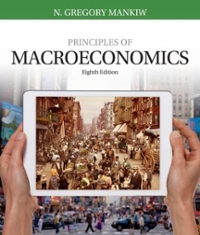Question
Negative Externalities The market for jelly has a supply and demand given by the following: QD=200-10p QS=20p-100 The production of jelly creates an externality with
Negative Externalities The market for jelly has a supply and demand given by the following: QD=200-10p QS=20p-100 The production of jelly creates an externality with marginal external cost of: MEC = 0.05Q (a) Find the competitive equilibrium price and quantity. (b) Find the CS, PS, and Total External Cost. (c) What is the efficient output (d) What is the deadweight loss? (e) Suppose a tax is used to eliminate the inefficiency from the externality. What tax would lead to the efficient output? (f) With the tax, find the price consumers pay and price sellers get. (g) What is the PS, CS, Government Revenue, and Total external cost with the tax? (h) Show that the deadweight loss matches the difference in welfare between (b) and (g). COULD YOU HELP ME TO EXPLAIN WHY THESE HAVE ANSWERS LIKE THIS.
Setting Qs=Qd P*=10 and Q*=100 (b) CS=500, PS=250, TEC=250 total welfare = 500+250-250=500 Note: the total external cost (TEC) is the area under the MEC curve up to Q=100. (c) First compute the inverse supply (PMC) and demand (PMB=SMB): PMB=SMB=20-0.05Q (inverse demand) PMC=5+0.05Q Add PMC+MEC=SMC: SMC = 5+0.1Q Efficiency is where SMB=SMC Q=75 (d) DWL=62.5 (e) Tax = MEC at the efficient output, so T=3.75 (f) Pc = 12.5, Ps=8.75 (g) CS=281.25, PS=140.625, GR=281.25, TEC=140.625. (h) Before the tax, total welfare = CS+PS-TEC = 500 After the tax, total welfare = CS+PS+GR-TEC = 562.5. The difference is 62.5, i.e. the DWL
Step by Step Solution
There are 3 Steps involved in it
Step: 1

Get Instant Access to Expert-Tailored Solutions
See step-by-step solutions with expert insights and AI powered tools for academic success
Step: 2

Step: 3

Ace Your Homework with AI
Get the answers you need in no time with our AI-driven, step-by-step assistance
Get Started


